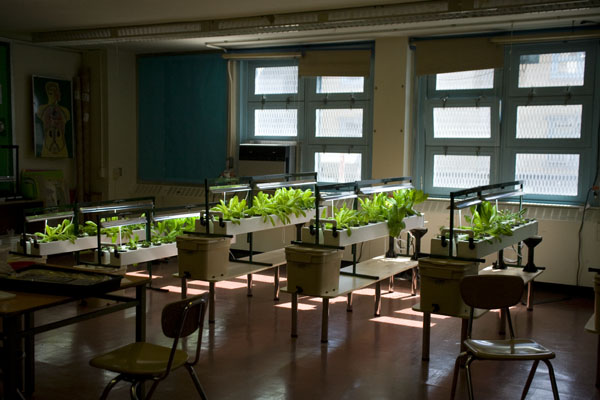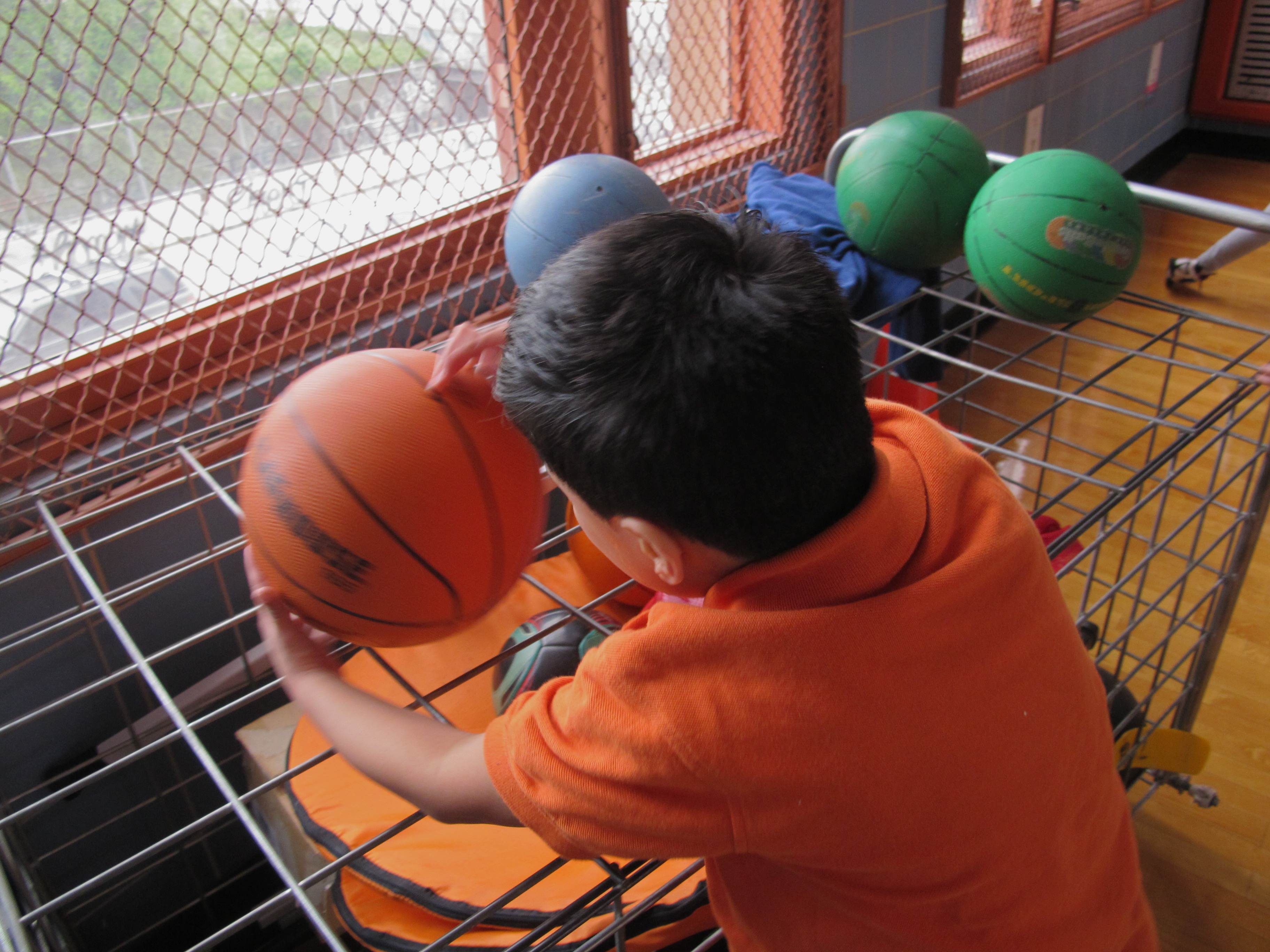On a recent afternoon in Christina Adebiyi’s Environmental Stewardship class at Public School 208, 20 fourth-graders were hard at work examining a map of their community. The students were crowded around an electronic whiteboard, called a SMARTBoard, attempting to locate local homeless shelters and food banks. The activity was part of a project that encouraged students to improve their community by first understanding their neighborhood, and then finding resources to help those in need. Environmental stewardship is taught to all third through fifth graders at P.S. 208, or the Alain L. Locke Elementary School, a magnet school in Harlem that serves 200 third, fourth, and fifth graders.

But when the new school year starts in August, supporters of the magnet school worry that classes like Adebiyi’s will disappear. The Success Academy charter school network will be moving 150 fifth-graders from Harlem Success Academy 2 and 3 into the same building as P.S. 208. This move has pitted supporters of the magnet school against advocates of the charter school. It also represents a clash between two types of school choice: magnets, specialized programs within public schools, and charters, public schools that operate independently. Both claim to offer parents alternatives to traditional public schools.
Parents at the magnet school are appealing the move to the Department of Education because they say that adding another school to the building will stop the growth of the magnet program. According to Laurie Frey, secretary of the Community Education Council 3, the appeal process could take time. “Right now they have several weeks to ‘Answer,’ the appeal, then we ‘Reply.’ So it will be several more weeks at least,” Frey said.
Supporters of 208 are worried that the school will become overcrowded and will be unable to accept more students and meet diversity targets required by the 2010 federal grant that allowed for the establishment of the school. Success Academy’s

administrators say that the building has plenty of room for another school, and is running under capacity.
Some opponents of the move contend that the dispute is about more than space. Harlem Success currently has schools in Districts 4 and 5. P.S. 208 is located in District 3 and already shares space with three other schools: an early childhood magnet school, a school for kids with special needs, and the Harlem Link charter school. Opponents say there is no reason for an out-of-district school to take space away from a District 3 school. But at a public comment meeting at P.S. 208, Gregg Betheil, Executive Director at the Office of School Programs & Partnerships at New York City’s Department of Education, argued that other possible sites won’t work. One school in District 4 is expanding a high school, while another has a high level of students with autism who require separate classrooms. Betheil said that the Department of Education had ruled that several other schools had too few “excess rooms” or are already temporary locations of other charter schools.
The federal grant that funded the magnet program at P.S. 208 is part of 2010 initiative that awarded $100 million to 36 school districts across the country for new magnet programs. P.S. 208 decided to focus its magnet program on the environment, and used the grant to create new classes, obtain technology like SMARTBoards and iPads, and set up science labs where students can grow their own plants.

Sharon Rosen, magnet specialist at the District 3 office, said magnet schools are an option that doesn’t require a lottery —unlike charter schools. “We are creating something great for every child,” Rosen said.
Symone Manning, the PTA president for 208, said that finding creative ways to advertise the program is a challenge. While charter schools often have long waiting lists, P.S. 208 has more spaces than applicants. Manning said that’s because parents in the area often don’t realize there is a magnet school in their neighborhood. She said that parents frequently receive flyers for the charter schools, since the Success Academy network has a bigger budget for advertising and student recruitment.
According to Kerri Lyon, a spokeswoman for the Success Academy charter network, Success did a lot of advertising and outreach to recruit applicants. As a result, the 12 schools received a record number of 12,300 applicants total this year.
Claudette Abney, the P.S. 208 PTA vice president, said the school just wants to see their magnet grant reach its potential. “We are not saying charters are bad,” she said. “Just give us a chance. Give the kids a chance to experience something differently.”
Rosie Quinones, 59, has a granddaughter in fourth-grade at Harlem Success 3. She believes all parents should have a choice. “What’s the difference between charter schools and regular schools?” Quinones asked. “It’s the same thing. At the end of the day, they are learning the same thing.”
The magnet school is already preparing to share space. Symone Manning says that if Success Academy moves in, P.S. 208 will shrink from two floors to just one. Two classrooms that are now utilized by District 75 special education teachers will disappear. The counselor will lose her office and will move across the street to another public school, which means she will have to travel several minutes each way to take kids from P.S. 208 to counseling.
Another school in the building, Harlem Link Charter, will lose its library, and the speech therapist for P.S. 208 will move into a room with two other special education staff members.
“It really hinders us, really at a crucial point,” Manning said. She said that even though her son will move on to middle school next year, she is concerned about the fate of P.S. 208. “I want another little boy, another little girl in Harlem to experience this,” she said.
Department of Education officials say the charter school isn’t a threat to the viability of the magnet school. At a public hearing in March, Greg Betheil, executive director of the Office of School Programs and Partnerships, said he didn’t think that adding Harlem Success would jeopardize the magnet grant.
Success Academy officials agreed, issuing a statement claiming that there is plenty of room for their students in District 3. The statement said that the building that houses P.S. 208 and three other schools is only at 79 percent capacity. The statement also said that enrollment in the building has declined over the last six years.
Success Academy spokeswoman Jenny Sedlis said that sharing space with P.S. 208 will not threaten the school. “How many more times is this same group of opponents going to spread their lies in the hopes of denying children access to a great education?” she wrote in a press release she handed out at the public comment meeting as Success’s response.
Lyon, the other Success Academy spokesman, believes only good things can come from all parties involved in this shared space situation. “We work very well with the other schools we share space with in the pursuit of creating a campus of excellence for all students,” she said. “But more importantly, the community will benefit from having another high-quality public school option to choose among.”
Success Academy’s academic track record has also worked to its advantage. The school boasts impressive results: 90 percent of third graders at Harlem Success Academy 2 and 3 passed the state math test in 2011. The Department of Education stated that it

believes this record of success will support and enhance the two magnet schools in the building.
But other city officials are less certain that sharing space with Harlem Success is a good idea. Comptroller John Liu has sided with the opponents, saying that it makes no sense to jam two more schools into a building that already has existing schools. “It’s not the kind of learning environment we need,” he said. Symone Manning, the PTA president, says parents may worry about overcrowding and avoid the magnet school. “A lot of other parents will take their kids out,” Manning said. “It’s a ripple effect of the whole district, not just our zone. It affects everybody.”
Success Academy, which already has nine schools in the city, has also proposed six additional schools that if approved, will open in 2013.



Are you trying to say Magnet schools are better than Charter schools??!
I really can see the power of magnet schools, you make some great points!
I think what they are saying is that Charter Schools are a- pushy, b – bad neighbors, and c – their senior staff come off like the “mean girls” in your junior high school class.
The DOE should be ashamed for squeezing public school children like sardines so that charter schools and their private networks can have public school space.
This educational corporation’s representative calling public school parents “liars” is just one more example of the attempts of the cherry-picking, duplicitous, and privatizing “mean girls” at HSA to push the public out of public education. One unspoken issue in your article is: “why are all these poor people living in such a nice (valuable) neighborhood?”.
PS 208 is two blocks from Central Park. The IRT station at W.110th Steet and Lennox Ave/Malcolm X Blvd. is three stops from Times Square (15 minute commute?). The real estate values are still a gleam in many a speculator’s eye.
The public housing developments, and the adjacent public schools, are neither rich nor filled with college educated neighbors. If one can dislocate the poor people from their schools, perhaps onc can dislocate them from their housing too?
There are, in fact, charter schools that work well with their neighbors — in the public school building as a “co-located school organization” and in the greater community — and there are charter organizations that have horrible manners, with very rich bankers for backers, and that really beleive their own press releases.